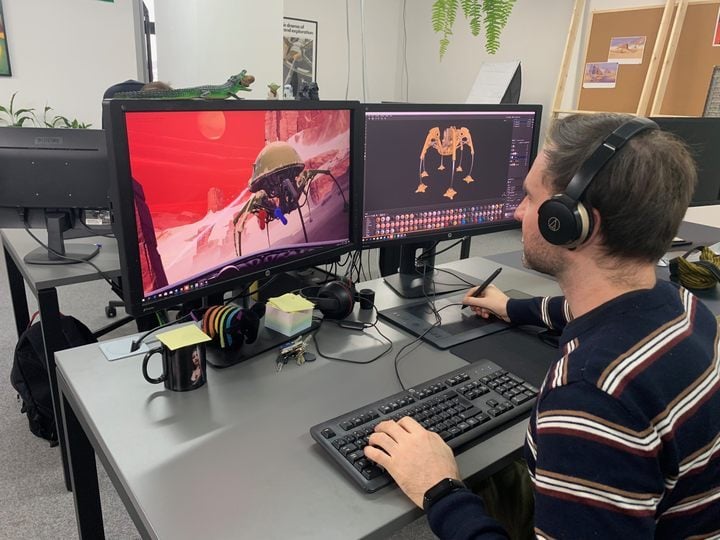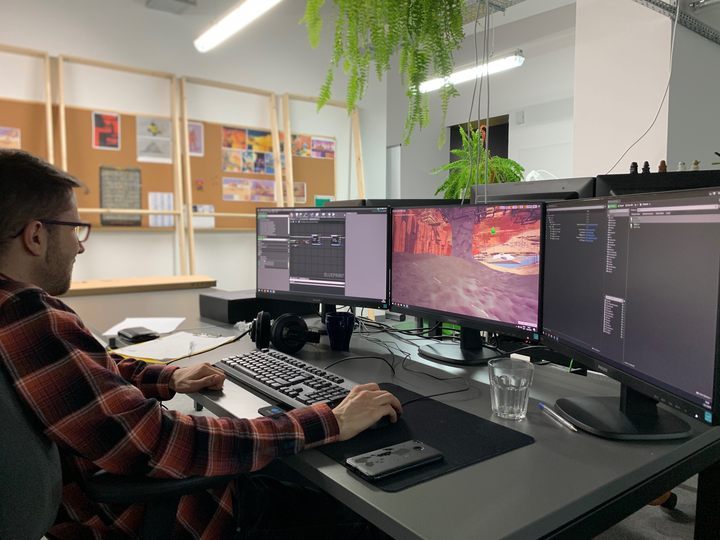Retrofuturism and Atom Punk. Invincible - New Sci-fi Game Based on Lem's Book - Conversation with the Developers

- Invincible - New Sci-fi Game Based on Lem's Book - Conversation with the Developers
- Retrofuturism and Atom Punk
- What is the game based on Stanislaw Lem's book about?
- People first
Retrofuturism and Atom Punk
"Lem never entered the era of digitization in his books. We still have giant computing machines that download information using punch cards. No flat screens – just heavy, cathode-ray tubes and oscilloscopes. We're closely following the same trail. People explore space, but no one’s ever heard of mobile phones," says Michal Galek.

Indeed, all the displays I saw in the game were old, convex CRTs, and the gadgets I used resembled devices used in the 50s or 60s. Lem imagined the future that derived directly from the present. That's why today, his approach is defined as retrofuturism. Consequently, all the devices in the game are analog. The creators emphasize they devote a lot of time to properly designing the machines – "We wonder how the device should look in order to evoke the analog era. A touch-screen, wireless tablet would be a show-stopper for us."

You can imagine the problems such an approach creates. Just take the map, for instance – Lem had no interactive maps, nor modern UIs that would display points of interest. Things ought to be quite similar in Project I – about the only aid we will get during exploration will be an absolutely regular map, and we'll have to mark navigational points manually. Let's remember – you are a scientists on an alien planet. Your main job is exploration, and that just can't be easy without digital systems. Doesn't such a concept curb creativity? "These limitations create the impression of integrity of the entire game. It requires some effort, but once we finally implement, we get massive satisfaction from creating something that challenges the regular approach; something original,” explains Marek Markuszewski.
We have the comfort that Lem didn't have, in that we know how technology has developed. That's why we're looking for retro-substitutes of today's technologies, they have to make sense within the world conceived by him.
Michal Galek
The biggest problem was probably... feedback. Any measurements taken by a scientist have to yield feedback. But there's no screens that could display that information. So we opted for punch cards that use a decoder. We also have devices with lights indicating the type of the result. Or a simple oscilloscope capable of creating simple graphs, showing the right values. Real-time transmission of information between the machine and the person on the ground – this was a big problem.
Marek Markuszewski
STANISLAW LEM vs. GAMES
Gamepressure: Were you sure from the very beginning that you wanted to base your game on a Lem's novel?
Marek Markuszewski: No, but it came about quickly. The first decision I made was simply that I want my own studio, and that I want to create my own project.
GP: So why Lem? Hasn't he fallen into somewhat of a neglect lately?
MM: The man was a genius writer, and I though his creativity would give us the right momentum – this stuff is just perfect for a video game. When I was reading the book we are adapting, I immediately saw the potential. I instantly knew how to approach it.
GP: Will the ending be identical as in the book?
Michal Galek: It doesn't have to. We develop reliable alternative endings that can be achieved by making certain decisions. But it's not like we've come up with some completely left-field ideas. If we decide to expand the scope of Lem's ideas, we want to make sure we don't diverge from anything he was writing about. We want the people who have red Lem to feel exactly like readers of Sapkowski when they played the first Witcher. A complete, comprehensive adaptation of the original.
MM: We're striving not to alter the message and meaning of the book. We're telling the exact same story, at the same time looking for room for player's influence.
GP: So you basically have two groups of consumers. The die-hard fans of Lem that will spot any discrepancy, and the people who haven't read him at all.
MG: We realize that a great many players don't know Lem, but our tacit ambition is to introduce them to this writer.
GP: Aren't you afraid that Lem might be a bit too difficult?
MM: Absolutely not – this simply is a modern, approachable game that tackles mature issues. This won't be some crude indie.
MG: At the same time, the book we're adapting is very adventurous. The protagonist is a scientist, but there's plenty of unexpected situations, the pacing is nowhere near sluggish; there are adventures and turns of events. This is not a game about sauntering around the primordial craters of some remote planet and pondering over philosophical concepts.
GP: Do you use the same concepts and definitions Lem used?
MG: Yes, definitely. And if we create new ones, we're striving to stick to the convention of, let's call it, retro-morphology of language. For example, we have this system similar to GPS, but we call it a "radiotracker."
GP: How do you think Lem would feel about your game?
MM: Lem was always very critical of the adaptations of his works. Well... We'd certainly feel a lot more pressure if he was still alive.
MG: Perhaps modern lemologists who will play our game will try to deride us. Our big goal is making sure we can offer credible explanations of everything we put into the game.
GP: Have you thought about cooperating with some of them?
MG: Yes, we're actually considering this. In everything we do, we treat the original with absolute veneration. But there sure will be some elements that turn out controversial for someone –that's just the inherent risk of adaptations.
MM: I actually think that ardent fans of Lem will love it.
GP: At least you can be sure the writer won't sue you for 60 million.
MM: No, but when it comes to the inheritor of the copyrights, our agreement takes into account both the preliminary salary, as well as fair royalties. If the game is successful, they will be one of the beneficiaries.
